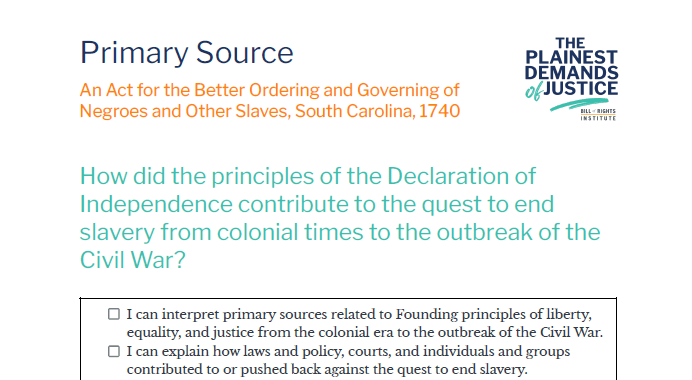An Act for the Better Ordering and Governing Negroes and Other Slaves, South Carolina, 1740
How did the principles of the Declaration of Independence contribute to the quest to end slavery from colonial times to the outbreak of the Civil War?
- I can interpret primary sources related to Founding principles of liberty, equality, and justice from the colonial era to the outbreak of the Civil War.
- I can explain how laws and policy, courts, and individuals and groups contributed to or pushed back against the quest to end slavery.
- I can create an argument using evidence from primary sources.
- I can analyze issues in history to help find solutions to present-day challenges.
Essential Vocabulary
| Mulatto | A person of mixed race, specifically of European and African or African American descent |
| Mestizo | A person of mixed race, specifically of European and Native American descent |
| Issue | A legal term meaning descendants (children, grandchildren, etc.) |
| Chattel | People held in a system of slavery in which they were actual property and could be bought, sold, traded, or inherited |
Building Context
Like Virginia, other southern colonies codified slavery over time, as shown in this document from South Carolina in 1740. In this way, chattel slavery, as it is called today, evolved gradually, beginning with customs before being written into law.
Transcript of the 1740 Slave Codes
Source: http://digital.scetv.org/teachingAmerhistory/pdfs/Transciptionof1740SlaveCodes.pdf
I. And be it enacted … That all Negroes and Indians, (free Indians in amity with this government, and degrees, mulattoes [persons of mixed European and African descent], and mustizoes [persons of mixed European and Native American descent], who are now free, excepted,) mulattoes or mustizoes who now are, or shall hereafter be, in this Province, and all their issue [all descendants] and offspring, born or to be born, shall be, and they are hereby declared to be, and remain forever hereafter, absolute slaves, and shall follow the condition of the mother, and shall be deemed, held, taken, reputed and adjudged in law, to be chattels personal, in the hands of their owners and possessors…
Comprehension and Analysis Questions
- How does this South Carolina law differ from the earlier Virginia law in Document 1?
